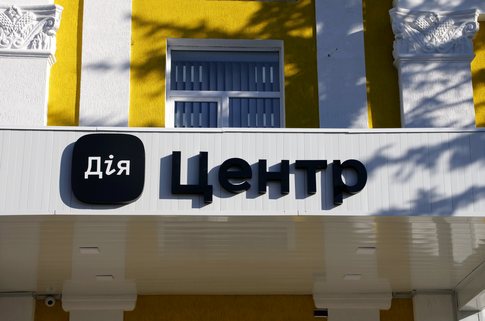
Thanks to the EU and UNDP, the 22,000 residents of Stanystia-Luhanska will have access to the services and documents they need in a newly renovated Administrative Services Centre.
The United Nations Development Program (UNDP) in Ukraine, with the financial support of the European Union, has opened a newly renovated Centre for Administrative Services (ASC) in the Stanytsia Luhanska community, located along the “contact line” in Luhansk Oblast.
The centre belongs to the network of Diia Centres. The network has introduced high-quality service delivery standards – convenient, fast, simple, and customer-oriented. Diia Centres function as a "single window" providing the entire set of services citizens need. Citizens can also obtain multiple administrative services in just one visit.
Speaking at the opening ceremony, Ambassador Matti Maasikas, Head of the EU Delegation to Ukraine, said the new centre would provide Ukrainian citizens with fast, hassle-free, and convenient services in Stanytsia Luhanska.
“Gone are the days of queuing in office after office, on an hours-long, frustrating paper chase to obtain a single document,” Maasikas said. “At this new one-stop shop, citizens can quickly make multiple applications for a wide range of services, in comfortable conditions and in a highly efficient manner.”
From now on, residents of the community will be able to access about 170 administrative services, including more than 50 social services. In addition, the centre will be connected to the Diia Centres Platform, which will give citizens access to government e-services.
At the opening of the first Diia Centre for administrative services in eastern Ukraine, UNDP Resident Representative in Ukraine Dafina Gercheva stressed that UNDP in Ukraine is helping to improve and expand access to public services in conflict affected communities, providing local people with practical solutions to their needs.
"We’re implementing programmes in partnership with international partners and local authorities, helping stakeholders identify innovative and durable solutions to development challenges and strengthen resilience, social inclusion and cohesion,” Gercheva said. “We're striving to ensure local governments are equipped with all the necessary tools they need to meet people’s aspirations and advance sustainable development.”
Gercheva also noted that one of UNDP’s priorities is to help make administrative and social services more accessible within communities, especially for vulnerable groups, including internally displaced persons.
Vice Prime Minister of Ukraine - Minister for Reintegration of the Temporarily Occupied Territories Iryna Vereshchuk stressed that access to administrative services on the 'contact line' should be exceptionally high quality and comfortable.
"The Diia Centre now works in Stanytsia Luhanska, and it's great! Access to administrative services must be of the same quality throughout Ukraine. But it should be especially convenient and comfortable on the 'contact line' for internally displaced persons. This is part of the Government's strategy for the integration of IDPs. We are sincerely grateful to our international friends for their support and assistance," Vereshchuk added.
Deputy Minister of Digital Transformation Liudmyla Rabchynska noted that from now on about 25,000 residents of Stanytsia Luhanska, as well as residents of non-government-controlled areas will be able to receive more than 200 public services in a single space – conveniently and quickly.
"We are working to increase the number of modernised Centres," Rabchynska added.
The building and equipment of the Administrative Services Centre in Stanytsia Luhanska at a cost of U.S. $500,000 was carried out by UNDP under the United Nations Recovery and Peacebuilding Programme, with the financial support of the European Union.
Background
The United Nations Recovery and Peacebuilding Programme (UN RPP) is being implemented by four United Nations agencies: the United Nations Development Programme (UNDP), the UN Entity for Gender Equality and the Empowerment of Women (UN Women), the United Nations Population Fund (UNFPA) and the Food and Agriculture Organisation of the United Nations (FAO).
Twelve international partners support the Programme: the European Union (EU), the European Investment Bank (EIB), the U.S. Embassy in Ukraine, and the governments of Canada, Denmark, Germany, Japan, the Netherlands, Norway, Poland, Sweden and Switzerland.
